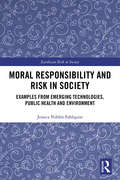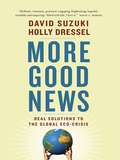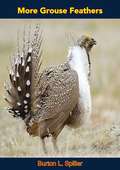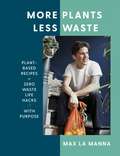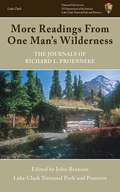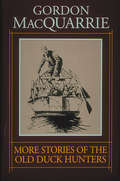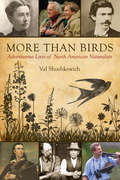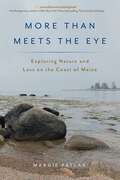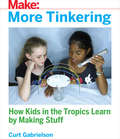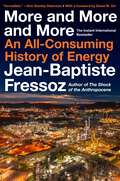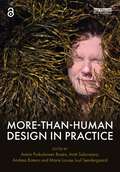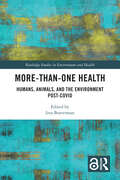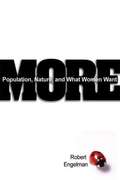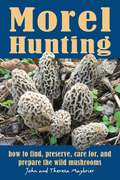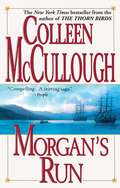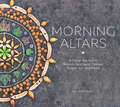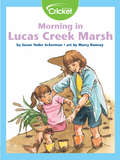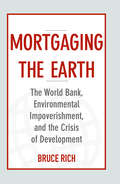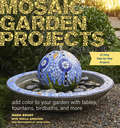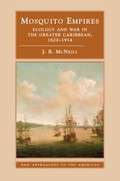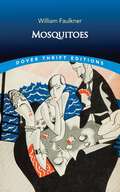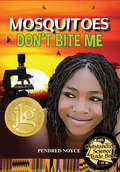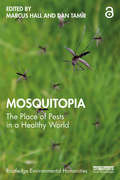- Table View
- List View
Moral Responsibility and Risk in Society: Examples from Emerging Technologies, Public Health and Environment (Earthscan Risk in Society)
by Jessica Nihlén FahlquistRisks, including health and technological, attract a lot of attention in modern societies, from individuals as well as policy-makers. Human beings have always had to deal with dangers, but contemporary societies conceptualise these dangers as risks, indicating that they are to some extent controllable and calculable. Conceiving of dangers in this way implies a need to analyse how we hold people responsible for risks and how we can and should take responsibility for risks. Moral Responsibility and Risk in Society combines philosophical discussion of different concepts and notions of responsibility with context-specific applications in the areas of health, technology and environment. The book consists of two parts addressing two crucial aspects of risks and responsibility: holding agents responsible, i.e. ascribing and distributing responsibility for risks, and taking responsibility for risk. More specifically, the book discusses the values of fairness and efficacy in responsibility distributions and makes distinctions between backward-looking and forward-looking responsibility as well as individual and collective responsibility. Additionally, it analyses what it means to take responsibility for technological risks, conceptualising this kind of responsibility as a virtue, and furthermore, explores the notion of responsible risk communication and the implications for adult-child relationships. This book will be of great interest to students and scholars of environmental ethics, bioethics, public health ethics, engineering ethics, philosophy of risk and moral philosophy.
More Good News
by David Suzuki Holly DresselIn this edition of their bestseller, the sequel to the best-selling Good News for a Change, authors David Suzuki and Holly Dressel provide the latest inspiring stories about individuals, groups, and businesses that are making real change in the world. More Good News features the most up-to-date information about critical subjects, such as energy and the economy, not covered in the previous edition. These stories offer compelling proof from the front lines that sustainable solutions already exist.
More Grouse Feathers (Fifty Greatest Bks.)
by Burton L. SpillerCLASSIC STORIES ABOUT AMERICA’S FAVORITE UPLAND GAME BIRD—AND ABOUT THE MEN AND DOGS WHO HUNT ITFirst published in 1938, this wonderful book is the follow-up collection of stories on grouse hunting by ruffed grouse hunting specialist Burton L. Spiller. His first collection, published in 1935, Grouse Feathers, was widely considered by many to be the best book ever written on the topic, and this second instalment of tales will no doubt take up another honorary spot in every grouse hunter’s library.Beautifully illustrated throughout by Lynn Bogue Hunt.“Burton L. Spiller’s twin books, Grouse Feathers and More Grouse Feathers, are classics; they are as stirring today as they were in their first Derrydale editions, so true that time stands still.“Long ago these volumes became collector’s items…. The incomparable delights of grouse hunting, the aroma of a clean wilderness, and the almost pagan rapport that exists between a man and his dog never change. I hold Burt Spiller the finest grouse writer who ever lived.”—Frank Woolner, author of Grouse and Grouse Hunting“The reappearance of these two delightful blendings of warm, sensitive prose and fine art will gladden the hearts of all grouse hunters and lovers of fine hunting literature….”—Eric Peper, Editor, Field & Stream Book Club
More Hidden Walks in the Bay Area: Pathways, Essays, and Yesterdays
by Stephen AltschulerThe thirty walking tours in the San Francisco Bay Area in this book follow paths, lanes, stairways, and streets. Walkers encounter creeks, waterfalls, redwood groves, and enchanting homes that blend into the landscape.
More Plants Less Waste: Plant-based Recipes + Zero Waste Life Hacks with Purpose
by Max La MannaDELICIOUS PLANT-BASED RECIPES TO WASTE LESS FOOD!Max La Manna, low waste chef and climate activist, bridges the gap between vegan food and waste-free cooking - inviting us to channel the MORE PLANTS LESS WASTE mindset and discover a stronger purpose in the kitchen and in our daily routines. --Through his viral recipe videos and work with BBC Earth and beyond, Max has inspired hundreds of thousands of people across the world to rethink their approach to food consumption and made it his mission to breathe new life into our leftovers that are typically destined for the bin. In his first cookbook he shares 80 of his tastiest, healthy recipes that are bursting with flavour, will help you save money, food and ensure you eat well - from Sumptuous Spag Bol and Vegan Shepherd's Pie to Pumpkin Pasta, Crunchy Cauliflower Curry or Leftover Veggie Nachos in a Hurry.. MORE PLANTS->LESS WASTE INCLUDES: - simple, accessible ingredients that celebrate the power of vegetables and wholefoods at their best- breakfasts, lunches, dinners, soups, stews and salads - plus sweet treats- all-natural home hacks from DIY deodorant to Citrus Bomb House Cleanser - the life tools you need to add value to what you already own and set you on the path to living more sustainably - a 21-day zero waste challenge
More Plants Less Waste: Plant-based Recipes + Zero Waste Life Hacks with Purpose
by Max La MannaMax La Manna, zero waste chef and sustainability advocate, bridges the gap between vegan food and waste-free cooking - inviting us to channel the MORE PLANTS LESS WASTE mindset and discover a stronger purpose in our daily routines. --Max has inspired thousands of people across the world to rethink their approach to consumption and made it his mission to turn the tide on plastic and breathe new energy into the leftovers that are typically destined for the bin. In his first cookbook he will share 80 of his tasty, healthy recipes that will have your taste buds watering, help you save money, food and eat well from Sumptuous Spag Bol and Crunchy Cauliflower Curry to Leftover Veggie Nachos in a Hurry.. MORE PLANTS->LESS WASTE INCLUDES: - simple, accessible ingredients that celebrate the power of plants and wholefoods at their best- all-natural home hacks from DIY deodorant to Citrus Bomb House Cleanser - the life tools you need to add value to what you already own and set you on the path to living more sustainably - a 21-day zero waste challenge--With a little more thought we can all make small changes that will have a BIG, positive impact on the health of our planet. --
More Readings From One Man's Wilderness: The Journals of Richard L. Proenneke
by John BransonRichard L. Proenneke--a modern-day Henry David Thoreau--built a cabin in Twin Lakes, Alaska, during the spring of 1968, sparking thirty years of personal growth in which he spent the majority of his time strengthening his relationship with the wilderness around him. Following in the footsteps of One Man's Wilderness, a classic book compiling some of the mountain man's journals, More Readings from One Man's Wilderness chronicles Proenneke's experiences with animals, the elements, park visitors, and observations he made while hiking in Lake Clark National Park and Preserve. A master woodcraftsman, a mechanical genius, a tireless hiker with a keen eye, and a journalist, Proenneke's life at Twin Lakes has inspired thousands of readers for decades.Editor John Branson--a longtime friend of Proenneke's and a park historian--ensures that Proenneke's journals from 1974-1980 are kept entirely intact. His colloquial writing is not changed or altered, but Branson's footnotes make his world more approachable by providing a background for names and places that may have otherwise been unknown. Any reader with a love for conservation and true-life wilderness narratives will undoubtedly admire and relish Proenneke's tales of living in the wild.
More Stories of the Old Duck Hunters
by Gordon MacquarrieMasterpieces you can read over and over is how the Washington Post reviewed MacQuarrie's engaging, timeless stories of the misadventures of the Old Duck Hunters Association.<P><P>Here are 53 classic hunting and fishing stories, some from sporting magazines of the 1930s and 1940s, including unpublished works from the author's literary estate.
More Than Birds: Adventurous Lives of North American Naturalists
by Val ShushkewichOnce people encounter the natural world and become aware of its intricacy, fragility, beauty, and significance, they will recognize the need for conservation. The fascinating development of natural history studies in North America is portrayed through the life stories of 22 naturalists. The 19th century saw early North American naturalists such as Alexander Wilson, the "Father of American Ornithology," John James Audubon, and Thomas Nuttall describing and illustrating the spectacular flora and fauna they found in the New World.Scientists of the Smithsonian Institution and the Canadian Museum of Nature worked feverishly to describe and catalogue the species that exist on the continent. Great nature writers such as Florence Merriam Bailey, Cordelia Stanwood, Margaret Morse Nice, Louise de Kiriline Lawrence, and Roger Tory Peterson wrote in depth about the lives and behaviours of birds. Early conservationists such as Jack Miner, the "Father of Conservation," created nature preserves.Today, noted naturalists such as Robert Nero, Robert Bateman, Kenn Kaufman, and David Allen Sibley do everything they can to encourage people to experience nature directly in their lives and to care about its protection and preservation.
More Than Meets the Eye: Exploring Nature and Loss on the Coast of Maine
by Margie PatlakWinner of the American Society of Journalists and Authors Award in the memoir/autobiography category!For award-winning science writer Margie Patlak, exploring the unique nature of the Maine coast opens a door to deeper ties and insights. Watching a striped monarch caterpillar transform into a chartreuse pendant dabbed with gold, she realizes the limits of life and what is passed between generations. Tides show how fleeting time is, and clouds and weather reveal greater forces that take away all illusions of control. She also explores the continental collisions that thrust up and fractured Maine&’s mountains; digs into the latest scientific thinking on how animals navigate; and exults in the dizzy dance of plankton under the microscope. Even moose, fox, and fishers reveal more than meets the eye.These facets of the natural world speak a hidden language Patlak translates with her scientific knowledge and reflection. Nature begins to speak about the nature of life.
More Tinkering: How Kids in the Tropics Learn by Making Stuff
by Curt GabrielsonTinkering is a way of learning through hands-on activity -- experimenting with materials and devices to see how they work, taking things apart, making small changes and improvements, exploring and inventing. Tinkering may seem like a form of play -- and it is -- but it is also a powerful way of discovering truths about science, engineering, and math. With this book, Curt Gabrielson follows up on his best-seller Tinkering: Kids Learn by Making Stuff with this all-new volume that features more than three dozen fun and educational tinkering projects based on his years of working with kids in the tropical island nation of Timor-Leste. Step-by-step instructions accompanied by full-color photos take you through a range of enjoyable projects that explore life sciences, physics, chemistry, earth sciences, and mathematics. You'll discover how math is used to make baskets, how fungi create fermentation, how electricity can make a magnet, how the greenhouse effect creates warming, and much more. The author also enlivens his latest batch of tinkering projects with colorful tales of his experiences in the tropic and the lives of the people he' s met there.Inside you'll find:Clear directions for making simple projects and doing activities that teach science, mathematics and engineeringProjects rooted in day to day life and experience in a small, developing nation in the Asian tropicsFull-color photographs throughoutExplicit connections to standard STEAM concepts, K-12Activities doable with less than $5 worth of common materialsThis book is perfect for parents, teachers, and students with an interest in hands-on, tinkering-based science and mathematics education, whether in traditional schools or in home-schooling situations. It will also be of interest to anyone who wants to learn more about developing nations, the culture and unique history of Timor-Leste, tropical nations or Asian cultures, with specific links to Indonesia, Portugal, or Australia.
More and More and More: An All-Consuming History of Energy
by Jean-Baptiste FressozThe radical, paradigm-shifting international bestseller that destroys our delusions about energy consumption and will change the way we talk about climate change. We have long been taught that humanity’s relationship with energy is one of progress, with wood superseded by coal, coal by oil, oil by nuclear—until at some future point everything will be replaced by “green” energy. But the long-held belief in transition and sustainability is completely untrue, Jean-Baptiste Fressoz argues.More and More and More demolishes this disastrous fallacy, showing how our industrial age and beyond has in fact been powered by an ever-greater accumulation of each major energy source feeding off the others. Using a fascinating array of examples from past and present, from the whaling and candle-making industries of the nineteenth century to our post-nuclear age today, Fressoz describes how humanity has gorged on all forms of energy—with whole forests used to prop up coal mines, and fossil fuels remaining central to the creation of innumerable new products we rely on every day. While nations have signed climate agreements aimed at reducing fossil fuels, the sad truth is that the world today burns more wood, coal, and carbon than ever before.More and More and More forces readers to confront hard truths, including how “transition” was originally promoted by energy companies, not as a genuine plan, but as a way to put off any meaningful change. It offers a clear-eyed understanding of the modern world in all its voracious reality and shines a hard light on the true nature of the enormous challenges eight billion of us face, as we stand at the precipice of planetary crisis.
More-Than-Human Design in Practice
by Anton Poikolainen Rosén Antti Salovaara Andrea Botero Juul Søndergaard, Marie LouiseThis book provides an overview of the diverse multidisciplinary field of more-than-human design, offering a philosophical grounding of more-than-human design in posthumanism while putting practical design examples and methods to the forefront.There is an urgent need to radically re-imagine design, as its current processes are contributing to global warming, pollution, deforestation, ocean acidification, ozone layer depletion, loss of biodiversity and species extinction. Given this need, ‘more-than-human design’ has emerged as a perspective that widens our thinking beyond solely human-oriented considerations and needs, such as animals, plants and microbes. The book explores the relationship between sustainability and design, touching on topics such as AI, systems thinking, futures studies and pedagogy, and discusses a range of case study projects that are grounded in more-than-human thinking, demonstrating how this can be incorporated into practice.This easily accessible and theoretically grounded book will provide design researchers and educators an excellent introduction to more-than-human thinking. It will also be of interest to students and scholars studying design more broadly, sustainability, environmental studies and service design, as well as to practicing designers interested in sustainability.Chapters Introduction, 7, 10 and 15 of this book are freely available as a downloadable Open Access PDF at http://www.taylorfrancis.com under a Creative Commons Attribution-Non Commercial-No Derivatives (CC-BY-NC-ND) 4.0 license.
More-than-One Health: Humans, Animals, and the Environment Post-COVID (Routledge Studies in Environment and Health)
by Irus BravermanThis edited volume examines the complex entanglements of human, animal, and environmental health. It assembles leading scholars from the humanities, social sciences, natural sciences, and medicine to explore existing One Health approaches and to envision a mode of health that is both more-than-human and also more sensitive to, and explicit about, colonial and neocolonial legacies—urging the decolonization of One Health. While acknowledging the importance of One Health, the volume at the same time critically examines its roots, highlighting the structural biases and power dynamics still at play in this global health regime. The volume is distinctive in its geographic breadth. It travels from Inuit sled dogs in the Arctic to rock hyraxes in Jerusalem, from black-faced spoonbills in Taiwan to street dogs in India, from spittle-bugs on Mallorca’s almond trees to jellyfish management at sea, and from rabies in sub-Saharan Africa to massive culling practices in South Korea. Together, the contributors call for One Health to move toward a more transparent, plural, and just perception of health that takes seriously the role of more-than-humans and of nonscientific knowledges, pointing to ways in which One Health can—and should—be decolonized. This volume will appeal to researchers and practitioners in the medical humanities, posthumanities, environmental humanities, science and technology studies, animal studies, multispecies ethnography, anthrozoology, and critical public health.
More: Population, Nature and What Women Want
by Robert EngelmanIn the capital of Ghana, a teenager nicknamed "Condom Sister" trolls the streets to educate other young people about contraception. Her work and her own aspirations point to a remarkable shift not only in the West African nation, where just a few decades ago women had nearly seven children on average, but around the globe. While world population continues to grow, family size keeps dropping in countries as diverse as Switzerland and South Africa. The phenomenon has some lamenting the imminent extinction of humanity, while others warn that our numbers will soon outgrow the planet's resources. Robert Engelman offers a decidedly different vision--one that celebrates womens' widespread desire for smaller families. Mothers aren't seeking more children, he argues, but more for their children. If they're able to realize their intentions, we just might suffer less climate change, hunger, and disease, not to mention sky-high housing costs and infuriating traffic jams. In More, Engelman shows that this three-way dance between population, womens' autonomy, and the natural world is as old as humanity itself. He traces pivotal developments in our history that set population--and society--on its current trajectory, from hominids' first steps on two feet to the persecution of 'witches' in Europe to the creation of modern contraception. Both personal and sweeping, More explores how population growth has shaped modern civilization --and humanity as we know it. The result is a mind-stretching exploration of parenthood, sex, and culture through the ages. Yet for all its fascinating historical detail, More is primarily about the choices we face today. Whether society supports women to have children when and only when they choose to will not only shape their lives, but the world all our children will inherit.
Morel Hunting
by John Maybrier Theresa MaybrierIdentifying the most popular wild mushroom and distinguishing them from false morels.
Morgan's Run: A Novel
by Colleen McCulloughColleen McCullough captivated millions with her beloved worldwide bestseller The Thorn Birds. Now she takes readers to the birth of modern Australia with a breathtaking saga brimming with drama, history, and passion.Following the disappearance of his only son and the death of his beloved wife, Richard Morgan is falsely imprisoned and exiled to the penal colonies of eighteenth-century Australia. His life is shattered but Morgan refuses to surrender, overcoming all obstacles to find unexpected contentment and happiness in the harsh early days of Australia's settlement. From England's shores to Botany Bay and the rugged frontier of a hostile new world, Morgan's Run is the epic tale of love lost and found, and the man whose strength and character helped settle a country and define its future.
Morning Altars: A 7-step Practice To Nourish Your Spirit Through Nature, Art, And Ritual
by Day SchildkretReturn to the earth with beautiful photographs and inspirational text. “Morning altars” are colorful mandalas that combine nature, art, and meditation. Incorporating the natural world into the everyday encourages positive well- being, even with the simplest of the earth’s gifts, such as leaves, flowers, berries, feathers, and stones. These stunning pieces of art are a peaceful and creative avenue to express gratitude for nature, to practice mindfulness, and to add meaning to daily life. In this book, Day Schildkret guides readers through the creation of morning altars, a seven- step process that includes wondering and wandering, place meditation, clearing space, creating, gifting, walking away, and sharing his art with others. Since his first morning altar, Schildkret has built hundreds more. His work has been warmly received on social media and he teaches workshops on altar building, all with the intention of sharing the positivity and beauty they have brought to his life.
Morning in Lucas Creek Marsh
by Susan Yoder AckermanThomas, Madeline, and their mother go on a walk through a Virginia tidewater marsh, spotting all kinds of wildlife along the way.
Mortgaging the Earth
by Bruce RichThe 1992 Rio Earth Summit was supposed to be a turning point for the World Bank. Environmental concerns would now play a major role in its lending--programs and projects would go beyond economic development to "sustainable development. " More than two decades later, efforts to green the bank seem pallid. Bruce Rich argues that the Bank's current institutional problems are extensions of flaws that had been present since its founding. His new book, Foreclosing the Future, tells the story of the Bank from the Rio Earth Summit to today. For readers who want the full history of the Bank's environmental record, Rich's acclaimed 1994 critique, Mortgaging the Earth, is an essential companion. Called a "detailed and thought-provoking look at an important subject" by The New York Times, Mortgaging the Earth analyzes the twenty year period leading up the Rio Summit. Rich offers not only an important history but critical insights about economic development that are ever-more relevant today.
Mosaic Garden Projects: Add Color to Your Garden with Tables, Fountains, Bird Baths, and More
by Mark Brody Sheila Ashdown“This thorough guide to techniques, tools, and materials is filled with expert tips and tricks. The detailed project instructions will inspire you to make your own mosaicked mark on the landscape.” —Lorene Edwards Forkner, author of Handmade Garden Projects In Mosaic Garden Projects, artist Mark Brody walks step-by-step through the creation of 25 decorative yet functional projects. With simple ideas like address signs and stepping stones to more complex projects such as an orb fountain, Brody also includes with a primer on the fundamentals of mosaic and information on the range of possible materials. Project templates are included along with instructions on how to scale each project. Mosaic Garden Projects is packed with inspiration that will brighten the garden all year long.
Mosquito Empires: Ecology and War in the Greater Caribbean, 1620-1914
by J. R. McNeillThis book explores the links among ecology, disease, and international politics in the context of the Greater Caribbean - the landscapes lying between Surinam and the Chesapeake - in the seventeenth through early twentieth centuries. Ecological changes made these landscapes especially suitable for the vector mosquitoes of yellow fever and malaria, and these diseases wrought systematic havoc among armies and would-be settlers. Because yellow fever confers immunity on survivors of the disease, and because malaria confers resistance, these diseases played partisan roles in the struggles for empire and revolution, attacking some populations more severely than others. In particular, yellow fever and malaria attacked newcomers to the region, which helped keep the Spanish Empire Spanish in the face of predatory rivals in the seventeenth and early eighteenth centuries. In the late eighteenth and through the nineteenth century, these diseases helped revolutions to succeed by decimating forces sent out from Europe to prevent them.
Mosquitoes (Dover Thrift Editions: Classic Novels)
by William FaulknerWilliam Faulkner’s inspiration for his second novel, Mosquitoes (1927), was his involvement in the 1920s New Orleans creative community. Mosquitoes explores the themes of sexuality and the societal role of the artist as it follows a bohemian cast of characters on a four-day cruise aboard the yacht Nausikaa, which is owned by a wealthy patron of the arts. The excursion on Lake Pontchartrain offers an intriguing glimpse into the youth of one of the most influential writers of the twentieth century.
Mosquitoes Don't Bite Me
by Pendred NoyceMosquitoes don't bite Nala Simiyu. It's part of who she is, like being a half-Kenyan seventh-grader whose mother is in a wheelchair. But when a schoolmate's father—who happens to head up a large drug company—learns of Nala's special power, the excitement begins. Nala has the chance to travel to Kenya to investigate mosquitoes' reactions to her father's family. All goes well until a man heartbroken by his daughter's death from malaria kidnaps Nala. In the midst of a realistic adventure story, this book will introduce young readers to such dilemmas as health disparities, subtle racism, and who owns biological information. Brave, fallible, compassionate and spirited, Nala is a strongly relatable character in a loving, imperfect family.
Mosquitopia: The Place of Pests in a Healthy World (Routledge Environmental Humanities)
by MarcusDan Hall TamïrThis edited volume brings together natural scientists, social scientists and humanists to assess if (or how) we may begin to coexist harmoniously with the mosquito. The mosquito is humanity’s deadliest animal, killing over a million people each year by transmitting malaria, yellow fever, Zika and several other diseases. Yet of the 3,500 species of mosquito on Earth, only a few dozen of them are really dangerous—so that the question arises as to whether humans and their mosquito foe can learn to live peacefully with one another. Chapters assess polarizing arguments for conserving and preserving mosquitoes, as well as for controlling and killing them, elaborating on possible consequences of both strategies. This book provides informed answers to the dual question: could we eliminate mosquitoes, and should we? Offering insights spanning the technical to the philosophical, this is the “go to” book for exploring humanity’s many relationships with the mosquito—which becomes a journey to finding better ways to inhabit the natural world. Mosquitopia will be of interest to anyone wanting to explore dependencies between human health and natural systems, while offering novel perspectives to health planners, medical experts, environmentalists and animal rights advocates.
